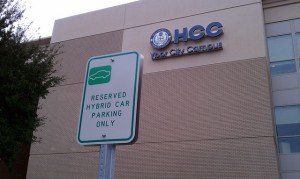Incentives Help Florida College Students Complete Math Courses, Study Finds

apalapala / Flickr
Hillsborough Community College students were more likely to visit tutors and complete remedial math courses with a $600 bonus on the line.
Hillsborough Community College students who were paid cash bonuses were more likely to complete remedial math courses and meet with math tutors, according to a new study from social science research firm MDRC.
The study looked at students in Hillsborough Community College’s Mathematics Access Performance Scholarship program, which pays students $600 per semester for three semesters, if they met goals. Those goals include visiting HCC’s Math Labs tutoring center at least five times and earning a ‘C’ grade or better on a college level math course or intermediate Algebra.
Researchers found:
- 87 percent of students in the bonus program visited a Math Lab, compared to 49 percent of students not receiving bonuses.
- About half of students in the program finished a college level math class or intermediate Algebra within two years. Of the students not paid bonuses, 38 percent completed one of those courses in the same time period.
- Students in the program earned 1.5 additional credit in their first semester and a half than students not paid bonuses.
- But students paid bonuses were no more likely to return to college than control group students. Researchers say they don’t yet know if students paid bonuses were more likely to complete their degree.
“The program does help move students further along in their math course,” said Michael Weiss, a researcher with MDRC who conducted the study.
“They’re pretty modest,” Weiss said of the gains. “So this is not some sort of silver bullet that’s really going to cause graduation rates to dramatically increase.”
MDRC is conducting similar studies at six schools, adjusting the size of the bonuses or the courses for which they are offered to see what works best.
The issue is important because studies show half the students who must take remedial courses at community colleges never finish their degree. And more students struggle with remedial math courses than with reading or writing.
A recent Florida law means students are no longer required to take remedial classes before starting on their degree. But many state colleges are still recommending the courses for students, so the incentives could help more students complete the courses.
Craig Johnson, vice president of academic affairs at Hillsborough Community College, said some students were putting off the required math courses until the end of their studies. Incentives could prompt those students to complete the courses sooner.
“We do know it’s very difficult to get them to come in [for tutoring],” Johnson said. “Better to lure them in.”
Hillsborough Community College’s incentive program is ending, but Johnson said the school might try other ways to entice students — such as free or discounted textbooks. Johnson said the gains are small, but little things can add up to big differences.
Paul Luna is president of the Helios Foundation, which funded the MDRC research.
Luna said the results are positive. The next step is figuring out how to expand the idea.
“This is focused on a particular type of student,” Luna said. “How do we make that concept available to all of their students?”